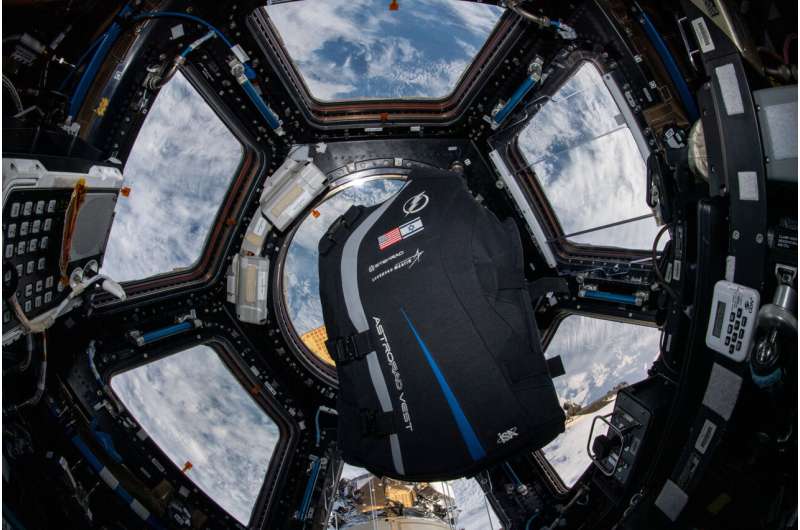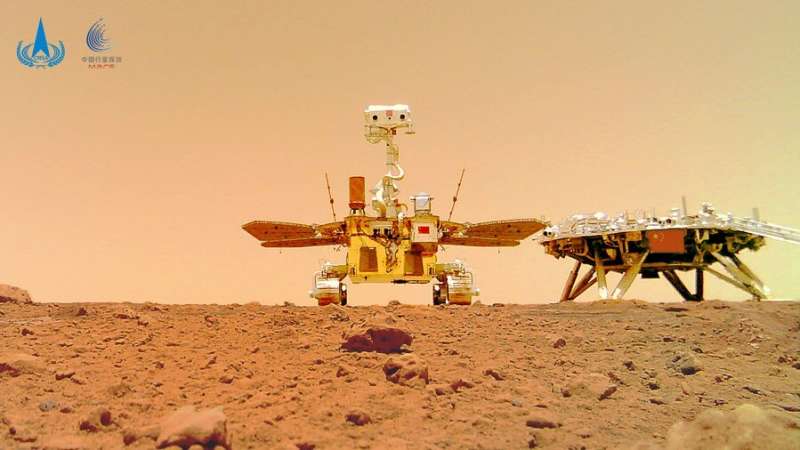
Copernical Team
Scientific samples, hardware return from International Space Station for more study

A radiation protection vest, olive oil, and sutured tissues are among the scientific samples returning from the International Space Station on the 26th SpaceX commercial resupply services mission for NASA. The Dragon spacecraft, which arrived at the station Nov. 27, is scheduled to undock on January 9, with splashdown January 11 off the coast of Florida.
The cargo returns to NASA's Kennedy Space Center in Florida, where scientists can make additional observations and analyses of their experiments before the effects of gravity fully kick back in. Many also conduct more in-depth analysis later in their home labs.
China unable to reestablish contact with its Zhurong Mars rover

China's National Space Administration (CNSA) has been hoping to reestablish communications with the Zhurong Mars rover, but so far, their efforts have been unsuccessful. Zhurong was put into hibernation over six months ago as it hunkered down in attempts to survive the Martian winter.
But it's been a tough winter in Utopia Planetia in Mars northern hemisphere where Zhurong is located. Not only were the temperatures extremely low, colder than -100°C (-148°F), but a regional dust storm severely reduced the likelihood of the rover collecting any power with its solar panels. This is the same dust storm that has hastened the end of NASA's Mars InSight mission.
According to the South China Morning Post, the mission team predicted Zhurong would resume operations around December 26 as the planet's northern hemisphere entered its spring season and environmental conditions improved.
UK space chiefs vows to try again after failed rocket launch
Space sector bosses on Tuesday said they were disappointed by the failure of the country's historic first attempt to launch satellites from UK soil but pledged to investigate and try again.
The failure of the mission late on Monday is a blow to the UK's fledgling space sector.
Had it been successful, it would have made the UK one of only nine countries able to launch rockets into Earth's orbit.
A Virgin Orbit Boeing 747 carrying the 70-foot (21-metre) rocket took off from a spaceport in Cornwall, southwest England, at 2202 GMT on Monday.
The rocket then detached from the aircraft and ignited as planned at a height of 35,000 feet over the Atlantic Ocean to the south of Ireland at around 2315 GMT.
But as the rocket was due to enter orbit and discharge its nine satellites, scientists reported an "anomaly" that prevented it from reaching orbit.
Virgin Orbit CEO Dan Hart praised the launch teams but said their task had been complicated by the "first time nature of this mission" which had "added layers of complexity".
"We will work tirelessly to understand the nature of the failure, make corrective actions and return to orbit as soon as we have completed a full investigation and mission assurance process," he added.
Virgin Orbit reports 'anomaly' in satellite launch from UK

UK space industry mulls setback after satellite launch fails

NASA space missions pinpoint sources of CO2 emissions on Earth
 A duo of Earth-observing missions has enabled researchers to detect and track carbon dioxide (CO2) emission changes from a single facility, using the world's fifth-largest coal-fired power plant as a test case.
In the recent study, researchers used space-based measurements from NASA's Orbiting Carbon Observatory (OCO) 2 and 3 missions to quantify the carbon dioxide discharged hundreds of m
A duo of Earth-observing missions has enabled researchers to detect and track carbon dioxide (CO2) emission changes from a single facility, using the world's fifth-largest coal-fired power plant as a test case.
In the recent study, researchers used space-based measurements from NASA's Orbiting Carbon Observatory (OCO) 2 and 3 missions to quantify the carbon dioxide discharged hundreds of m Fossil pollen 'sunscreen' proves role of ozone depletion in largest mass extinction
 Scientists from China, Germany and the UK led by Prof. LIU Feng from the Nanjing Institute of Geology and Palaeontology of the Chinese Academy of Sciences (NIGPAS) have revealed that pollen preserved in 250-million-year-old rocks contains abundant compounds that function like sunscreen but are produced by plants to protect themselves from harmful ultraviolet (UV-B) radiation.
The presence
Scientists from China, Germany and the UK led by Prof. LIU Feng from the Nanjing Institute of Geology and Palaeontology of the Chinese Academy of Sciences (NIGPAS) have revealed that pollen preserved in 250-million-year-old rocks contains abundant compounds that function like sunscreen but are produced by plants to protect themselves from harmful ultraviolet (UV-B) radiation.
The presence Planet Labs completes acquisition of Salo Sciences
 Planet Labs PBC (NYSE: PL), a leading provider of daily data and insights about Earth, has announced the completion of its acquisition of Salo Sciences, a San Francisco-based climate technology company that provides cutting-edge solutions to measure Earth's constantly changing ecosystems. In December, Planet announced it had signed an agreement to acquire Salo Sciences.
With the purchase o
Planet Labs PBC (NYSE: PL), a leading provider of daily data and insights about Earth, has announced the completion of its acquisition of Salo Sciences, a San Francisco-based climate technology company that provides cutting-edge solutions to measure Earth's constantly changing ecosystems. In December, Planet announced it had signed an agreement to acquire Salo Sciences.
With the purchase o Mitsubishi Electric announce the AnyMile logistics operations management platform
 Mitsubishi Electric US, Inc. has announced its drone-based logistics operations management platform, called AnyMile, a holistic solution that is designed to enable businesses and fleet operators to schedule and manage cargo deliveries via drones over long distances of up to several hundred miles.
The platform is intended to support operation across all known categories of drones - multi-ro
Mitsubishi Electric US, Inc. has announced its drone-based logistics operations management platform, called AnyMile, a holistic solution that is designed to enable businesses and fleet operators to schedule and manage cargo deliveries via drones over long distances of up to several hundred miles.
The platform is intended to support operation across all known categories of drones - multi-ro U.N. panel says ozone layer will recover in about 40 years
 Earth's ozone layer is on track to recover within four decades thanks to the 1987 Montreal Protocol, then a landmark multinational environmental agreement, a United Nations-supported panel said on Monday.
The Montreal Protocol regulated the consumption and production of nearly 100 manmade chemicals that researchers complained created ozone depletion. The panel on Monday said that 99% of
Earth's ozone layer is on track to recover within four decades thanks to the 1987 Montreal Protocol, then a landmark multinational environmental agreement, a United Nations-supported panel said on Monday.
The Montreal Protocol regulated the consumption and production of nearly 100 manmade chemicals that researchers complained created ozone depletion. The panel on Monday said that 99% of 
